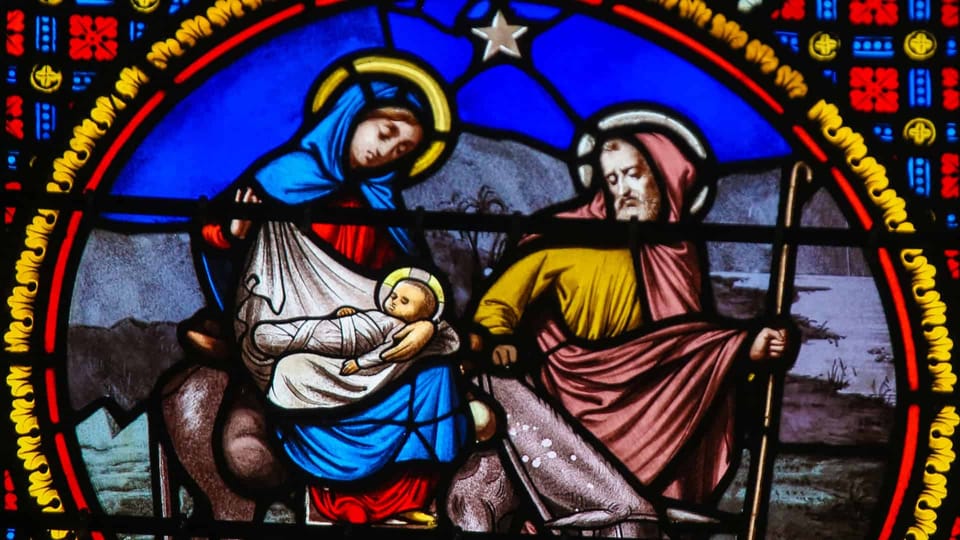Out of Egypt (Matthew 2:15)

Big Idea: No matter how bad things get, God’s pattern is clear: He always ultimately delivers his people.
Kay Bruner is a licensed professional counselor who lives in Dallas, Texas. But for a while she was also a missionary to the Solomon Islands, working to complete a New Testament in the Arosi language, which she completed after ten years of hard work.
Bruner married her high school sweetheart, Andy. They had four children together. She loved God and served him.
One Sunday morning, she declared herself done. She left her house, walked to where her church was meeting. Out of nowhere, she heard herself saying, “I can’t do this anymore.” She thought of dying. “This question ran through my mind, over and over: how had trying so hard to do what I thought God wanted me to do, ended up in being so done?” she asked.
What happened? Trying so hard had led her to feel anxious, which over time led to depression. Her husband, Andy, used pornography to deal with his issues. “Eventually, the façade of our fabulous goodness fell, and we were left with a marriage and a missionary career in crisis. At that point, there was no more try-hard left in me. I just could not.”
A marriage in crisis. A husband with a porn habit. Some difficulty with the missions organization. All of this conspired to push her to the edge. She experienced a major depressive episode.
I had lost my capacity for feeling good things, doing things right, being in control, being the good wife, the good mom, managing the home. I was in the dark, and I lost my ability to pretend otherwise. I couldn’t protect myself, much less anyone else, from my emotions. The pain and the panic and the inability to process created an undertow that drew me down, time and again, until I thought I would not survive it. (As Soon As I Fell)
How does someone like Kay Bruner end up like that? You would think that someone who dedicated her life to God like that would end up with a good life, not with her marriage in crisis, her ministry over, and worst of all, with depression.
An Old Question
It’s an old question: why do God’s people seem to end up in crisis so often?
Why did God allow the Chinese government to raid the Early Rain Covenant Church in the city of Chengdu, arresting about 100 church members? Why is the pastor Wang Yi missing in Chinese custody?
Why did Derek Bass plant a church in Providence, Rhode Island, only to make the “extremely difficult, gut-wrenching, and tearful” decision to pull the plug on the church plant?
Why do God’s people seem to end up in trouble so consistently?
You may have wrestled with this question personally. You may be in the middle of a personal crisis yourself. You may relate to the question a famous nun supposedly asked God one day when she slipped down an embankment and fell squarely into the mud: “If this is how You treat Your friends, no wonder why You have so few of them!”
Why does God seem to allow us to suffer so much, and what is he doing about it? Believe it or not, this is the question the story in front of us helps to answer.
Jesus’ Family in Trouble
Jesus’ family is in trouble. Jesus was still young, under two years old. Herod the Great, who ruled that area, had caught wind that Jesus had been born and could cause him some troubles, and he wasn’t happy about it. You would not have wanted Herod to be unhappy with you. Herod murdered his own wife, several sons, and other relatives who got in his way. And so when Herod got ticked at you, you took notice.
And so when an angel warned Joseph, “Rise, take the child and his mother, and flee to Egypt, and remain there until I tell you, for Herod is about to search for the child, to destroy him” (Matthew 2:13), Joseph took notice. “He rose and took the child and his mother by night and departed to Egypt and remained there until the death of Herod” (Matthew 2:14-15). I’d never noticed until this week how suddenly everything seemed to happen. Imagine having a dream like that, waking up, and getting your family out the door under cover of darkness to travel some 700 kilometers to escape a madman. That is not a good situation.
Once again, evil seems to be getting the upper hand, just like it always had.
It’s in the middle of this that we read this very strange verse: “This was to fulfill what the Lord had spoken by the prophet, ‘Out of Egypt I called my son’” (Matthew 2:15).
Matthew links all the way back to Hosea 11:1, which seems to have nothing to do with Jesus. When you go back to Hosea 11, you realize that he’s looking back to an event that took place hundreds of years earlier, when God brought the young nation out of Egypt. Listen to Hosea 11:1:
When Israel was a child, I loved him,
and out of Egypt I called my son.
This passage speaks of God’s historical love for his people, bringing them out of captivity in Egypt and setting them free.
At first glance, it seems bizarre to apply this passage to Jesus. What is Matthew doing here? The answer couldn’t be more important for you and for me.
The Pattern
Matthew is identifying a pattern, a way that God tends to work. It’s a pattern, that takes place with Israel in the Exodus, and one that’s repeated in the life of Jesus. If we learn this pattern, it will help us when we face it as well. There’s a trajectory that’s repeated so many times that we’re supposed to figure out, “Oh, okay, that’s how God works.” It’s really a lesson about how God works. It’s “based on a conviction of the unchanging character of the principles of God’s working.”
The technical name for this is a type: an actual historic event that points forward to something bigger than itself. It’s something that actually happened and yet has a bigger fulfillment.
So what’s the pattern?
God chooses his people.
You see this over and over again in the Bible. God graciously calls people to himself. This goes all the way back to Abraham, and continues to the creation of his people Israel, and has continued throughout the centuries since. We’re part of this. If you are a follower of Jesus Christ, he has chosen you.
1 Peter tells us, “But you are a chosen race, a royal priesthood, a holy nation, a people for his own possession, that you may proclaim the excellencies of him who called you out of darkness into his marvelous light” (1 Peter 2:9).
God’s people suffer.
God chooses you. You would think that means a free pass. It actually means the opposite. Throughout history, God’s people have been under attack. It’s endless. For instance, God grew the nation of Israel as a fulfillment of his promise, and he gave them Moses as a leader. It’s amazing.
But then Pharaoh starts killing off all the male babies, and he enslaves them. He keeps making life harder for them so that conditions become unbearable.
This is the history of the world. It explains why life is so hard for God’s people. Peter tells us:
Be sober-minded; be watchful. Your adversary the devil prowls around like a roaring lion, seeking someone to devour. Resist him, firm in your faith, knowing that the same kinds of suffering are being experienced by your brotherhood throughout the world. (1 Peter 5:8-9)
This is the Christian life. It’s not trouble-free. Expect to suffer. You can no more relax than if you were out for a stroll at the African Lion Safari, because Satan is on the loose, and he’s dangerous.
That’s why Kay Bruner ended up done. That’s why, at least in part, church plants close. That’s why Wang Yi is missing in Chinese custody. And it’s why you and I can expect to suffer as God’s people.
When Satan encounters God’s people, he always attacks. There is more martyrdom today than at any point in history. We’re spared martyrdom in the west, but you can be sure: Satan still attacks.
Here’s the final part of the pattern.
God delivers his people from trouble.
Absolutely nothing can take place outside of God’s control. Nothing can thwart his plan. It may look like things are out of control, but God always accomplishes his plan.
So why doesn’t it look like it? Why does he allow us to go through trials? Because God even has a purpose in those trials.
God does not tempt us (Jas 1:13), but he does allow tests (Jas 1:2–4; 1 Pet 1:6–7), and the purpose is to make us more aware of our need to depend wholly on him. In times of serious trials, when many things are going wrong, we must turn and cry “Abba, Father” and join Jesus’ Gethsemane prayer, “Abba, Father … everything is possible for you. Take this cup from me. Yet not what I will, but what you will” (Mark 14:36). We must surrender to the divine providence, ask for deliverance, trust in God’s wisdom, and know that “in all things God works for the good of those who love him” (Rom 8:28). (Grant Osborne)
Make no mistake: evil seems to get the upper hand in the short term, but God never allows evil to triumph in the end.
Here’s the message of this story in one sentence, and it’s an important one: “Jesus’ return from Egypt is a promise to the church down through the ages that God ultimately delivers his people” (Grant Osborne). God’s pattern is clear: He always ultimately delivers his people. Not even death can get in the way.
This is what has allowed God’s people to put up with unbelievable suffering, even martyrdom. They know that no matter how bad things get, God’s got them.
Jesus is the ultimate proof of this. He is the climax of God’s plan to save his people. By the way, when God delivered his people from Egypt, it was the prelude to God making a covenant with them. When God delivered Jesus out of Egypt, it was a prelude to him making a new covenant with us: a covenant of grace.
Matthew is saying that this pattern finds its fulfillment in Jesus. Jesus embodies all of God’s people. The Bible has a term for this. We are in Christ. When you come to Jesus in faith and repentance, he binds you so closely to Jesus that he unites you to Christ so that what’s true of him becomes true of you. You are safe because you are in Jesus, and nothing can touch you.
What is this passage about? It’s about God’s pattern, which finds its fulfillment in Jesus. No matter how bad things get, God’s pattern is clear: He always ultimately delivers his people. God isn’t troubled by anything. He’s got you and every detail of your life. Just as Moses delivered his people from slavery to Pharaoh, Jesus will deliver people from slavery to Satan.
Let me close with these words from the famous British preacher Charles Spurgeon:
…from under the power of sin, of Satan, and of the world God will certainly call his own redeemed. They shall not abide in the land of Egypt; sin shall not be pleasant to them; they shall not continue under Satan’s power, but they shall break his yoke from off their neck. The Lord will help them, and strengthen them, so that they shall clean escape from their former slavery. With a high hand and an outstretched arm brought he up Israel out of the land of Egypt, and with that same high hand and outstretched arm will he save his own elect, whom he has loved from before the foundations of the world, and whom he has purchased with his most precious blood. They, too, shall sing as Israel did, “Sing unto the Lord, for he hath triumphed gloriously,” in the day when God shall deliver them.
No matter how bad things get, God’s pattern is clear: He always ultimately delivers his people.





